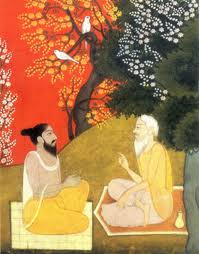What kind of answer can you expect?
There are two great examples that best illustrate this point. The first is from the Upanishads which is one of the earliest Hindu philosophical texts. The second is from the twelfth century Sufi classic “The Conference of the Birds” by Farid ud-din Attar.
a) Indra’s Experience - Learning About the Self – Chandogya Upanishad
The Upanishads are part of sacred Hindu texts. Historians have differing opinions about its age. Most agree that it predates Buddhism and parts of it are believed to be as old as the Vedas.
"The Self which is free from sin, free from old age, free from death, free from grief, free from hunger, free from thirst, whose desires come true and whose thoughts come true—That it is which should be searched out, That it is which one should desire to understand. He who has known this Self from the scriptures and a teacher and understood It obtains all the worlds and all desires.” - Prajapati, Chandogya Upanishad

The Upanishads tells the tale of Indra (on behalf of the gods ) and Virochana (among the demons) who on hearing the above go to Prajapati himself to learn about the Self.
(Pic left: Indra, the Hindu God of Rain with his consort.)
After performing the practice of brahmacharya for thirty two years, they ask Prajapati the meaning of his words.
Prajapati tell them that "The person that is seen in the eye—that is the Self." He further said: "This is immortal, fearless. This is Brahman." They asked:"Venerable Sir, he who is perceived in the water and he who is perceived in a mirror—which of these is he?" Prajapati replied: "The same one, indeed, is perceived in all these."
He asks them to look at themselves in the water and ask him further if there’s anything they don’t understand. They look in the water and see full clear reflections of themselves including their hair and nails. Prajapati further asks them to adorn themselves in their best and look at their reflections again. Prajapati said,
"This is the Self, this is immortal, fearless. This is Brahman." Satisfied with the answer, both Indra and Virochana leave.
Disappointed Prajapati said, "They are both going away without having known and without having realized the Self. And whoever of these, whether gods or demons, follow this doctrine shall perish." Virochana, satisfied in his heart, returned to the demons preaching: "The self (which is the body) alone is to be worshipped here on earth, the self (i.e. body) alone is to be served. It is only by worshipping the self here and by serving the self that one gains both worlds—this and the next."
“The demons therefore practice no charity and have no faith. They deck the bodies of the dead with garlands, perfume and ornaments because they think these will help them win the world beyond.”
Indra reflecting on the words thought “As this reflection in the water is well adorned when the body is well adorned, well dressed when the body is well dressed, clean when the body is clean, so this reflection in the water will be blind if the body is blind, one—eyed if the body is one—eyed, crippled if the body is crippled and will perish if the body perishes.” Seeing its limitations he returned to Prajapati and served him for another thirty-two years.

Prajapati then told him
"He who moves about, exalted, in dreams—this is the Self, this is immortal, fearless. This is Brahman."
Satisfied Indra left once more for the gods, but on reflection realised: "Although this dream self is not blind even if the body is blind, nor do its eyes and nose run when the eyes and nose of the body run; although this self is not affected by the defects of the body, "Nor killed when it (the body) is killed, nor one—eyed when it is one—eyed—yet they kill it (the dream self), as it were; they chase it, as it were. It becomes conscious of pain, as it were; it weeps, as it were. I do not see any good in this doctrine."
On returning to Prajapati and serving another thirty two years he learned,"When a man is asleep, with senses withdrawn and serene and sees no dream—that is the Self. This is immortal, fearless. This is Brahman."
Satisfied with the answer, Indra left again but on his way he could see the difficulty with this as well: "In truth it (i.e. the self in dreamless sleep) does not know itself as ‘I am it,’ nor these other creatures. It has therefore reached in dreamless sleep utter annihilation, as it were. I do not see any good in this."
This time Prajapati only asked him to serve another five years, at the end of which he said,
 “O Indra, this body is mortal, always held by death. It is the abode of the Self which is immortal and incorporeal. The embodied self is the victim of pleasure and pain. So long as one is identified with the body, there is no cessation of pleasure and pain. But neither pleasure nor pain touches one who is not identified with the body.
“O Indra, this body is mortal, always held by death. It is the abode of the Self which is immortal and incorporeal. The embodied self is the victim of pleasure and pain. So long as one is identified with the body, there is no cessation of pleasure and pain. But neither pleasure nor pain touches one who is not identified with the body.
"The wind is without body; the cloud, lightning and thunder are without body. Now, as these, arising from yonder akasa and reaching the highest light, appear in their own forms, "So does this serene Being, arising from this body and reaching the Highest Light, appear in His own form. In that state He is the Highest Person. There He moves about, laughing, playing, rejoicing—be it with women, chariots, or relatives, never thinking of the body into which he was born. "As an animal is attached to a cart, so is the prana (i.e. the conscious self) attached to the body.
"When the person in the eye resides in the body, he resides where the organ of sight has entered into the akasa (i.e. the pupil of the eye); the eye is the instrument of seeing. He who is aware of the thought: ‘Let me smell this,’ he is the Self; the nose is the instrument of smelling. He who is aware of the thought: ‘Let me speak,’ he is the Self; the tongue is the instrument of speaking. He who is aware of the thought: ‘Let me hear,’ he is the Self; the ear is the instrument of hearing.
"He who is aware of the thought: ‘Let me think this,’ he is the Self; the mind is his divine eye. He, the Self sees all these desires in the World of Brahman through the divine eye, the mind and rejoices.
"The gods meditate on that Self. Therefore all worlds belong to them and all desires. He who knows that Self and understands It obtains all worlds and all desires."
This story illustrates many points. Virochana was satisfied with the simplest of answers, while Indra made four attempts, analysing and discriminating each reply until he received the deeper more meaningful answer that truly satisfied his heart. It took him 32 years for each the first three attempts to gain the necessary life-experience and guru wisdom to be able to reflect deeply enough on each level of reply and rise to the next challenge. In total it took a 101 years for the four attempts showing enormous patience, striving, dedication and perseverance to finally earn his reward of true understanding.
In the next post we will look at the example from the Sufi classic “The Conference of the Birds” by Farid-ud-din Attar.
<<Previous Next>>

 The Upanishads tells the tale of Indra (on behalf of the gods ) and Virochana (among the demons) who on hearing the above go to Prajapati himself to learn about the Self. (Pic left: Indra, the Hindu God of Rain with his consort.)
The Upanishads tells the tale of Indra (on behalf of the gods ) and Virochana (among the demons) who on hearing the above go to Prajapati himself to learn about the Self. (Pic left: Indra, the Hindu God of Rain with his consort.)
 Prajapati then told him "He who moves about, exalted, in dreams—this is the Self, this is immortal, fearless. This is Brahman."
Prajapati then told him "He who moves about, exalted, in dreams—this is the Self, this is immortal, fearless. This is Brahman."  “O Indra, this body is mortal, always held by death. It is the abode of the Self which is immortal and incorporeal. The embodied self is the victim of pleasure and pain. So long as one is identified with the body, there is no cessation of pleasure and pain. But neither pleasure nor pain touches one who is not identified with the body.
“O Indra, this body is mortal, always held by death. It is the abode of the Self which is immortal and incorporeal. The embodied self is the victim of pleasure and pain. So long as one is identified with the body, there is no cessation of pleasure and pain. But neither pleasure nor pain touches one who is not identified with the body. 


Recent comments
9 years 1 week ago
9 years 12 weeks ago
9 years 12 weeks ago
9 years 12 weeks ago
9 years 13 weeks ago
9 years 14 weeks ago
9 years 15 weeks ago
9 years 15 weeks ago
9 years 15 weeks ago
9 years 15 weeks ago